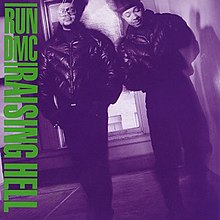| Raising Hell | ||||
|---|---|---|---|---|
 | ||||
| Studio album by | ||||
| Released | May 15, 1986[1] | |||
| Recorded | 1985–1986 | |||
| Studio | Chung King, New York City | |||
| Genre | ||||
| Length | 39:46 | |||
| Label | Profile | |||
| Producer | ||||
| Run-D.M.C. chronology | ||||
| ||||
| Singles from Raising Hell | ||||
| ||||
Raising Hell is the third studio album by American hip hop group Run-D.M.C., released on May 15, 1986, by Profile Records. The album was produced by Russell Simmons and Rick Rubin. Raising Hell is notable for being the first Platinum and multi-Platinum hip hop record.[2][3] The album was first certified Platinum on July 15, 1986, before it was certified as 3× Platinum by the Recording Industry Association of America (RIAA) on April 24, 1987.[1] It is widely considered to be one of the greatest and most important albums in the history of hip hop music and culture.
Raising Hell peaked at number three on the Billboard 200, and number one on the Top R&B/Hip Hop Albums chart, making it the first hip hop album to peak atop the latter. The album features four hit singles: "My Adidas", "Walk This Way" (a collaboration with Aerosmith), "You Be Illin'" and "It's Tricky".[4] "Walk This Way" is the group's most famous single, being a groundbreaking rap rock version of Aerosmith's 1975 song "Walk This Way". It is considered to be the first rap rock collaboration that also brought hip hop into the mainstream[5] and was the first song by a hip hop act to reach the top 5 of the Billboard Hot 100.[6]
Raising Hell has been ranked as one of the greatest albums of all time. In 1987, it was nominated for a Grammy Award, making Run-D.M.C. the first hip hop act to receive a nomination.[7][8] In the same year, the album was nominated for Album of the Year and won Best Rap Album at the 1987 Soul Train Music Awards. In 2017, it was inducted into the National Recording Registry by the Library of Congress as being "culturally, historically, or aesthetically significant".[9] The album was reissued by Arista Records in 1999 and 2003. An expanded and remastered edition was released in 2005 and contained 5 previously unreleased songs.
Selling more than three million copies, Raising Hell is credited with heralding the golden age of hip hop as well as hip hop's album era, helping the genre achieve an unprecedented level of recognition among critics and mainstream audiences.[10]
- ^ a b "American certifications – Run-D.M.C. – Raising Hell". Recording Industry Association of America.
- ^ "Run-DMC and the Rap Flap (by Richard Harrington) [August 29, 1986]". washingtonpost.com. Retrieved May 1, 2019.
- ^ Jenkins, Sacha; Wilson, Elliott; Mao, Jeff; Alvarez, Gabe; Rollins, Brent (March 25, 2014). First 10 Platinum Rap Albums - Ego Trip's Book of Rap Lists (2014) - page 280. St. Martin's Publishing. ISBN 9781466866973. Retrieved May 1, 2019.
- ^ "Official Singles Chart - Run-D.M.C." officialcharts.com. Retrieved May 1, 2019.
- ^ Price, Simon (July 4, 2016). "Walk This Way: how Run-DMC and Aerosmith changed pop (by Simon Price) (July 4, 2016)". The Guardian. Retrieved May 1, 2019.
- ^ Cite error: The named reference
:0was invoked but never defined (see the help page). - ^ "29th Grammy Awards - 1987 (presented February 24, 1987)". rockonthenet.com. Retrieved February 21, 2021.
- ^ "RUN-D.M.C. at 29th Grammy Awards - 1987 (presented February 24, 1987)". grammy.com. November 23, 2020. Retrieved February 21, 2021.
- ^ "National Recording Registry Reaches 500 [MARCH 21, 2018]". loc.gov. Retrieved May 1, 2019.
- ^ Williams, Todd "Stereo" (May 16, 2016). "How Run-D.M.C.'s 'Raising Hell' Launched Hip-Hop's Golden Age". The Boombox. Retrieved February 20, 2021.